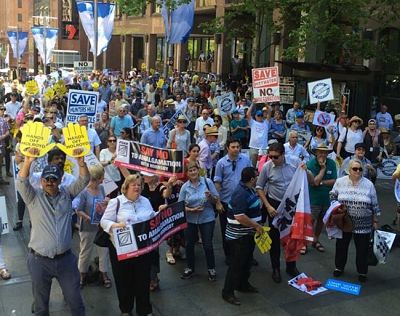NSW councils are refusing to go quietly, with many continuing to rail publicly against Premier Mike Baird’s forced merger program to axe forty councils.
Woollahra Council, in Sydney’s affluent Eastern Suburbs, is putting legal pressure on NSW Local Government Minister Paul Toole to abandon plans to merge it with Randwick and Waverley Councils or face Sydney silk Bret Walker, SC in court.
The council’s solicitors, Speed and Stracey, have written to Mr Toole arguing that he does not have the authority to force mergers onto councils under the Local Government Act.
The solicitors contested that changes made to the Act in 1999 streamlined voluntary council amalgamations – not forced mergers, provisions for which remain in the old act but are significantly more arduous – and gave him seven days to drop his plans or face a legal challenge.
Should the council succeed, it will turn up the political pain for the state government and could restart the entire merger process under a different section of the Local Government Act, dragging it on for multiple months.
Mr Toole has said he wants to see new councils in place by June this year but Woollahra’s audacious challenge is just one of the acts of council-led legal obstruction, many of them occurring in Liberal-voting heartlands, which could seriously derail his plans.
Several councils, particularly those divided up under earlier merger proposals, have submitted new plans after Warringah Council found a loophole in the Local Government Act (1993) allowing them to submit a rival plan for a Northern Beaches Council.
Warringah’s new proposal would mean it was no longer be split between a part merger with Pittwater and another with Mosman and Manly Councils as it is under an alternative merger plan.
A clutch of regional councils have taken the same path to avoid being splintered.
Jerilderie Shire Council has submitted a proposal to merge with Murrumbidgee and keep its local government area intact, rather than split between Berrigan Shire and Murrumbidgee, as the original proposal outlined.
Palerang has opted to amalgamate solely with Queanbeyan, rather than lose part of its council area to a merger with Goulburn Mulwaree as well.
Some councils have used the loophole in a bid to merge with fewer councils.
Corowa Shire also submitted an alternative proposal – the same as that recommended by the Independent Local Government Panel’s 2013 report – to merge with Urana Shire Council, rather than with Lockhart Shire too.
But it has further complicated matters for Mr Toole, who has been forced to submit new proposals – in the form of a one-page letter – for alternative mergers to fit around new proposals, such as mergers between Mosman, North Sydney and Willoughby, Dungog and Maitland and another between Boorowa and Young.
It has also meant another round of public inquiries to seek ratepayers’ feedback on the new proposals.
Rebellious councils are keeping up the pressure with a rally, Local Democracy Not Dictatorship, held at 12pm Sunday, March 13 at Hyde Park Fountain, led by Save Our Councils Coalition.
Comment below to have your say on this story.
If you have a news story or tip-off, get in touch at editorial@governmentnews.com.au.
Sign up to the Government News newsletter


Your story says ‘The solicitors contested that changes made to the Act in 1999 streamlined voluntary council amalgamations – not forced mergers, provisions for which remain in the old act but are significantly more arduous – and gave him seven days to drop his plans or face a legal challenge.’
How are forced mergers significantly more arduous, a simple reading of the Act makes them easier than voluntary mergers, which is what is happening.
Reading Hansard, the Government (Labor) made it clear the existing forced merger provisions were staying in the act, the purpose of the 1999 changes were to create a process for voluntary mergers and ways to delays to elections during merger processes.
The mergers don’t go far enough, we are way over governed with by far the smallest councils in major States. Let alone not enough restrictions on property developers and their self interested participation in local government.
Couple that with far far too many levels…
2 federal houses, plus 2 state houses, plus Local government
We don’t need 5 levels of representation